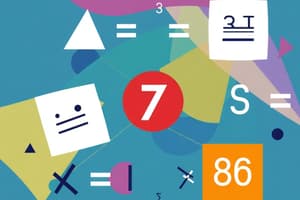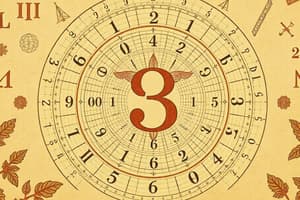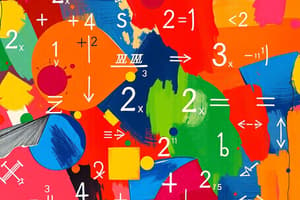Podcast
Questions and Answers
What is the main focus of algebra?
What is the main focus of algebra?
- Manipulating equations and expressions (correct)
- Studying shapes and sizes
- Understanding the properties of prime numbers
- Calculating rates of change
Which of the following concepts is NOT covered in arithmetic?
Which of the following concepts is NOT covered in arithmetic?
- Differentiation (correct)
- Prime numbers
- Addition
- Multiplication
What key aspect does calculus primarily investigate?
What key aspect does calculus primarily investigate?
- Rates of change and accumulation (correct)
- Size and shape of objects
- Patterns in number systems
- Properties of geometric figures
Which branch of mathematics studies the properties of integers?
Which branch of mathematics studies the properties of integers?
Which of the following best describes geometric principles?
Which of the following best describes geometric principles?
What type of reasoning is typically associated with deductive arguments in mathematics?
What type of reasoning is typically associated with deductive arguments in mathematics?
Which mathematical operation is part of basic arithmetic?
Which mathematical operation is part of basic arithmetic?
What do limits, derivatives, and integrals describe in calculus?
What do limits, derivatives, and integrals describe in calculus?
Flashcards
Mathematics
Mathematics
The study of quantity, structure, space, and change, using symbolic logic and formal systems to model patterns and relationships.
Arithmetic
Arithmetic
Basic math operations (addition, subtraction, multiplication, division) on numbers (integers, fractions, decimals).
Algebra
Algebra
Uses variables to represent unknowns and manipulates equations to solve.
Geometry
Geometry
Signup and view all the flashcards
Calculus
Calculus
Signup and view all the flashcards
Number Theory
Number Theory
Signup and view all the flashcards
Deductive Reasoning
Deductive Reasoning
Signup and view all the flashcards
Inductive Reasoning
Inductive Reasoning
Signup and view all the flashcards
Study Notes
Fundamental Concepts
- Mathematics is the study of quantity, structure, space, and change.
- It uses symbolic logic and formal systems to investigate and model patterns and relationships.
- Key branches of mathematics include arithmetic, algebra, geometry, calculus, and number theory.
- Mathematics is used in various fields like science, engineering, computer science, and economics.
Arithmetic
- Deals with basic operations on numbers: addition, subtraction, multiplication, and division.
- Includes concepts like place value, prime numbers, factors, and multiples.
- Operations can be performed on integers, fractions, decimals, and real numbers.
- Developing fluency in arithmetic is crucial for more advanced mathematical concepts.
Algebra
- Uses variables to represent unknown quantities.
- Focuses on manipulating equations and expressions to solve for variables.
- Includes topics like linear equations, quadratic equations, and systems of equations.
- Polynomials and factoring are essential skills in algebra.
- Introduces the concept of functions and relationships between variables.
Geometry
- Studies shapes, sizes, positions, and properties of objects in space.
- Covers concepts like points, lines, angles, triangles, quadrilaterals, circles, and three-dimensional shapes.
- Includes theorems and postulates that describe relationships between geometric figures.
- Different branches like plane and solid geometry.
- Emphasizes spatial reasoning and problem-solving using geometric principles.
Calculus
- Deals with continuous change, rates of change, and accumulation of quantities.
- Includes differentiation (finding the rate of change) and integration (finding the accumulation).
- Applications in physics, engineering, and other sciences are significant.
- Essential for modelling and solving problems involving change.
- Fundamental concepts are limits, derivatives, and integrals.
Number Theory
- Focuses on the properties of numbers, particularly integers.
- Includes concepts like prime numbers, divisibility, and modular arithmetic.
- Investigates patterns and relationships in number systems.
- Important for cryptography and other applications.
- Addresses questions about the distribution of prime numbers.
Logic in Mathematics
- Mathematical arguments are based on logical reasoning.
- Deductive reasoning uses established facts to derive new conclusions.
- Inductive reasoning uses patterns to make conjectures.
- Proofs are crucial to verify mathematical statements.
- Formal systems of logic underpin the structure of mathematical arguments.
Problem-Solving in Mathematics
- Mathematical problems involve applying concepts and techniques to find solutions.
- Understanding problem statements and identifying relevant information is critical.
- Developing strategies and techniques to solve problems is key to success in mathematics.
- Solving problems requires logical reasoning, creativity, and critical thinking skills.
- Trial and error, working backwards, and drawing diagrams are valuable problem-solving strategies.
Studying That Suits You
Use AI to generate personalized quizzes and flashcards to suit your learning preferences.





